App Development for Startups: 10 Steps Roadmap to Success in 2025
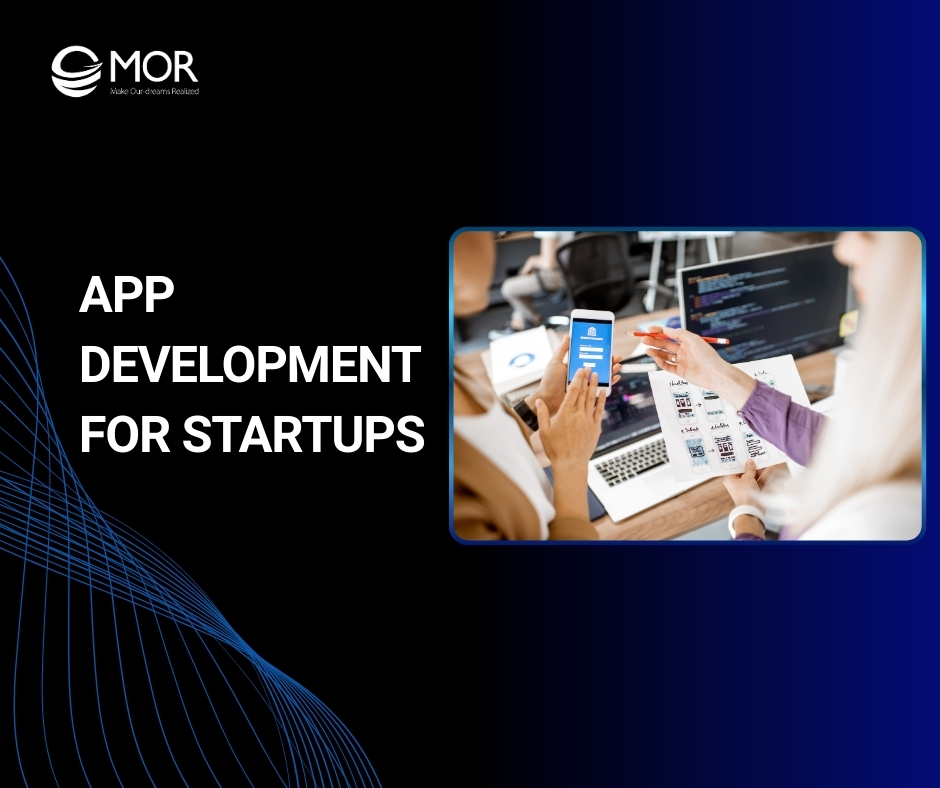
Building a product is exciting, but app development for startups can quickly become a challenge with limited budgets and tough competition. Many turn to a startup app development agency for guidance. This MOR Software’s guide shows the 10-step roadmap to launch and grow your app in 2025.
Why App Development For Startups Are Essential?
In 2024, people spent $150 billion on mobile apps, which was 13% higher than the previous year. At the same time, users spent around 4.2 trillion hours inside apps, showing how important mobile has become for both distribution and revenue. Most startup founders often turn to developers or outsourcing partners with mobile app development frameworks soon after launch. Still, the reasons behind building software can vary widely.
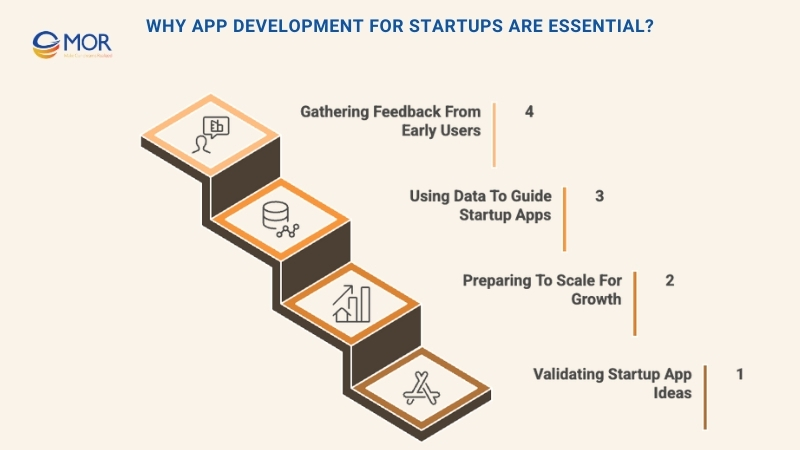
Validating Startup App Ideas
Many new founders quickly turn to developers or outsourcing partners after launch, but the goals for app development for startups can vary. A common starting point is building a minimum viable product (MVP). Instead of releasing a large solution filled with advanced features, startups test assumptions with an MVP that focuses only on the essentials.
Take a case like creating a peer-to-peer payment app. Rather than offering full banking functions, the MVP may only allow transfers by phone number. Once it’s released to early users, their reactions guide the decision to expand or shift direction. This helps confirm whether the idea is worth further investment. It’s a crucial step, since CB Insights found that 42% of startups fail mainly because there was no real market need.
For this stage, working with a startup app development agency can bring the technical skills and speed needed to launch quickly.
Preparing To Scale For Growth
At this stage, the cloud is more than a technical option. McKinsey projects that cloud adoption could add about $3 trillion in EBITDA by 2030, with many industries seeing average gains of 20–30% compared to their baseline.
After early adoption, the focus shifts to growth. Scaling means ensuring the app can handle more traffic while keeping costs under control. Hosting on the marketing automation cloud allows startups to increase resources as demand rises, keeping performance stable during growth. At the same time, this approach makes it easier to explore new markets without heavy spending on infrastructure.
If in-house hiring is difficult, outsourcing parts of the work to trusted specialists is a proven way forward. Reliable partners can fill skill gaps and speed up delivery, which is often decisive for startups that must scale fast to stay ahead.
Using Data To Guide Startup Apps
A strong product mindset makes app development for startups more than just coding features. It creates tools that collect and analyze real user data, which helps founders make smarter decisions. McKinsey found that companies using customer analytics deeply are 23 times more likely to win new customers and 19 times more likely to reach profitability compared to their peers.
Startups can track purchase patterns, customer sentiment, or behavioral trends through built-in analytics. With the right setup, the app sends data back to servers for storage and processing, turning raw numbers into insights that support future growth. Partnering with a software development company for startups can help set up these data-driven functions from the very beginning.
Gathering Feedback From Early Users
Feedback is often the most valuable input a startup can receive. Direct insights from early users help refine the app, improve usability, and keep the product relevant in a competitive market. Apps can be equipped with simple tools for feedback collection, or advanced options like AI-powered HR chatbot.
Speed is important too. 51% of consumers say they prefer bots for instant service, which makes these tools effective for capturing quick signals and routing issues right away.
These chatbots not only answer basic questions but also capture user concerns and pass them to support teams. Real-world deployments also show operational lift; for example, Verizon reported nearly a 40% increase in sales after rolling out a Google AI assistant to help its agents.
In this way, app development for startups becomes an ongoing conversation with the audience, guiding improvements and shaping the next release.
Main Types Of Apps For Startups
Choosing the right kind of application is a big decision in app development for startups. Each type comes with strengths and trade-offs, so founders need to match the approach with their audience and business goals. The main categories are:
- Native apps: These are built for a single platform like iOS or Android, using platform-specific languages and tools. They deliver the highest performance and user experience but require separate work for each platform, which increases cost and time.
- Cross-platform apps: Using framework in software such as Flutter or React Native, these apps run on several platforms from one codebase. This speeds up delivery and saves money, though some native functions may not be fully supported. Many app development companies for startups rely on this model for quicker launches.
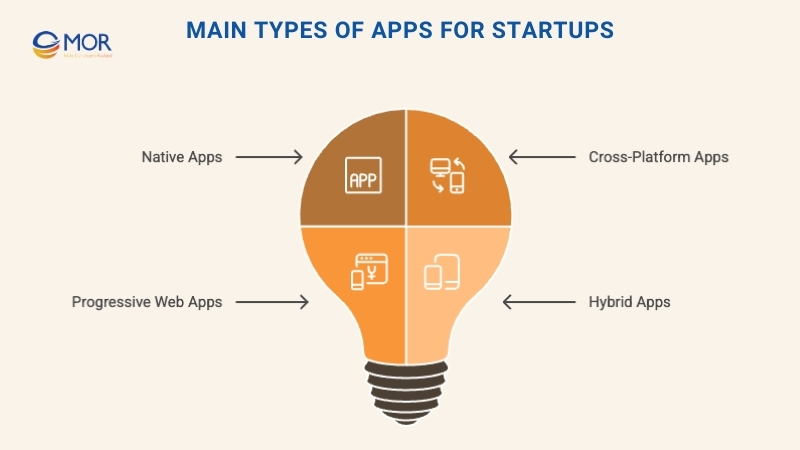
- Progressive web apps (PWAs): PWAs act like native apps but run directly through web browsers. They are simple to maintain and cheaper to build. Still, their access to device hardware is limited, which may restrict advanced features.
- Hybrid apps: These combine parts of both native and web apps. They allow startups to cover multiple platforms with a single build. While they balance cost and reach, they often cannot match the full responsiveness of native solutions.
Factors Affecting App Development For Startups
Several elements can shape the results of app development for startups, and founders must pay attention to each one.
Budget often stands out first. According to Clutch, the average cost of an app development project is about $90,780, and the typical timeline is around 11 months. These figures show why clear scoping and prioritization are so important.
Since most startups run on limited funding, every choice matters, from which features to build to which platforms to support. With a small budget, it makes sense to focus on core features and consider cross-platform solutions instead of costly native builds.
Time is another pressing issue. Many young companies aim to release quickly, and the best path is often through a minimum viable product (MVP). An MVP includes only the core features, leaving room to expand later with updates. This approach speeds up release but requires clear decisions on what’s truly needed at launch. For many teams, working with the best app developers for startups can help strike the right balance between speed and quality.
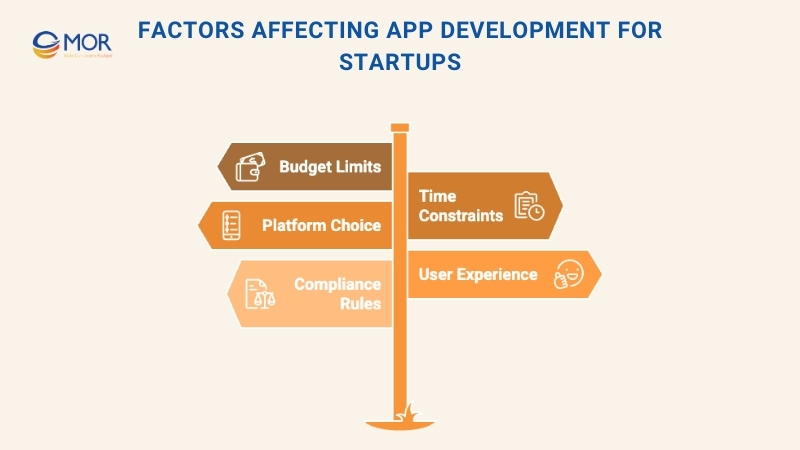
Platform choice also plays a large role. Deciding between iOS, Android, or both can affect costs, deadlines, and audience reach. Globally, Android holds about 74% of the mobile OS market while iOS accounts for around 26%. In the U.S. the numbers reverse, with iOS at about 57% and Android at 42%. This split often guides which platform startups choose to launch first. If most users favor iPhones, iOS might be the logical first step. If the audience is spread across devices, supporting both platforms from the beginning may bring better results.
User experience should never be underestimated. An app that looks sharp, runs smoothly, and feels simple to use is far more likely to retain customers. Even the strongest business idea can fail if the interface feels clumsy. That is why solid UX and UI design at the start can determine whether people stay engaged or delete the app after one try.
Finally, compliance must be considered. Startups that gather user data or operate in regulated fields need to follow strict privacy and security rules. Issues like data protection, user consent, and legal requirements should be handled from day one, because ignoring them can create serious problems later.
Taken together, these factors include budget, timing, platform, design, and compliance. They outline the reality of app development for startups. Understanding them early gives founders a clearer path to building products that can succeed in the market.
>>> Explore essential insights and recommend suitable Web3 development services solutions in the Web3 ecosystem!
10 Steps Roadmap For App Development For Startups
Following a clear process, founders can transform an app idea into a working product that drives revenue. This guide breaks down the journey into practical steps, giving startups a roadmap to approach app development for startups with confidence. Let’s explore the following app development steps.
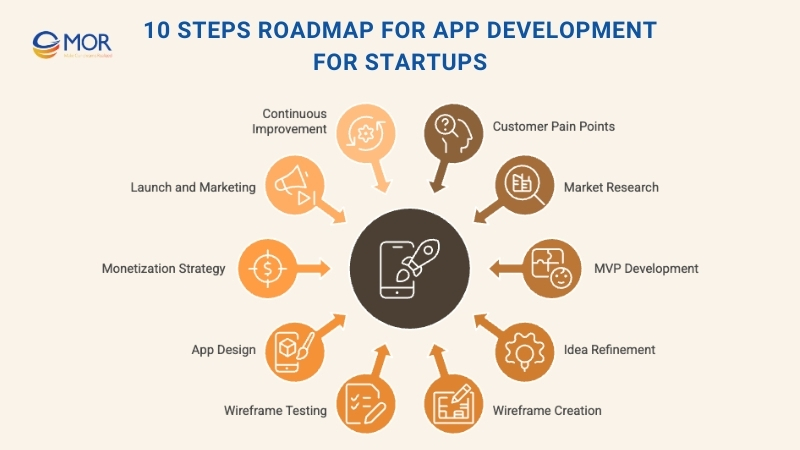
1. Identify Customer Pain Points
The first stage in app development for startups is gaining a deep understanding of the customer’s challenges. Without clarity on the real problem, no app can deliver meaningful value. This is true for both new founders and established companies. If internal resources for research are limited, working with a startup app development agency can provide critical insights into market needs.
Think about it this way: if you don’t know the exact pain point, designing a relevant solution becomes impossible. Pinpointing what frustrates your users and aligning your product to solve that issue puts you ahead of competitors from the very beginning.
As an owner, showing that you care about customer struggles and are committed to addressing them builds early trust. This discovery phase is not just about survival, it sets the foundation for the app’s long-term success.
In today’s crowded market, startups that recognize and adapt to the ‘real needs’ of their audience stand out. Flexibility in adjusting to changing demands only strengthens that edge. Identifying these core pain points, you also define a clear vision and purpose for your app, ensuring every next step has direction.
2. Research The Market
Validating your app idea through proper research is one of the most important parts of app development for startups. Skipping this step risks wasting time, effort, and money on something the market may not want. A solid study confirms whether the idea has real potential and long-term demand.
Even if you are not yet working with hybrid mobile app development companies for startups, you should still perform your own groundwork. Look at competitors to see if similar products exist and whether they are profitable. This analysis highlights gaps you can address and also shows the level of competition you will face.
Here are practical ways to test the market:
- Google Trends: Track search volumes for keywords related to your idea and see if interest is rising or falling.
- Small surveys: Ask simple questions about app usage, preferences, and habits. The answers can guide fine-tuning before launch.
- Competition review: Analyze existing apps that serve your target audience. Understand their strengths, weaknesses, and user satisfaction levels.
Combining these methods, startups get a clearer picture of market readiness. This foundation helps shape the product, reduces risk, and increases the chance of success once the app goes live.
3. Build And Test A Minimum Viable Product
In app development for startups, one of the biggest mistakes is believing you need a flawless product before showing it to users. The truth is that nearly every successful app we see today has been refined through hundreds of updates, driven by feedback over time.
That’s why building a minimum viable product (MVP) is such a valuable step. An MVP captures only the core features needed to solve your customers’ main problems. It represents the simplest and most affordable version of your idea while still delivering value. Because of this, MVP development is considered one of the most important stages for any startup.
In practice, the MVP acts as an early prototype that includes only the ‘must-have’ functions. It is launched to a small audience to gather honest feedback from potential customers and even business partners. This input guides improvements and highlights which areas need more attention. For many founders, working with experts in custom mobile app development for startups helps ensure the MVP is strong enough to test but flexible enough to evolve.
4. Refine And Finalize The App Idea
Once the MVP is tested, the next stage in app development for startups is refining the idea. Early feedback often uncovers gaps, unexpected issues, or new opportunities. This step is about filtering those insights, improving the concept, and shaping it into a version ready for broader adoption.
Founders should review what worked, what didn’t, and what features customers actually care about. Dropping unnecessary elements saves time and resources, while focusing on high-value features strengthens the product. This process transforms an initial idea into a well-defined app strategy.
Many app startups succeed because they listen carefully to early users and adapt quickly. Refinement also gives you the chance to adjust monetization strategies, design flows, or technical architecture before scaling. Finalizing the concept here, you ensure the app is not just an idea, but a realistic, market-ready product.
5. Create A Wireframe
Once your MVP has gained traction and proven interest, the next step in app development for startups is building a wireframe. A wireframe acts as the blueprint of your app, showing the structure, placement of elements, and how users will interact with it. This stage is no longer optional, it has become a critical part of the development process.
Think of it like the sketch an architect prepares before starting construction. The wireframe is your app’s skeleton, mapping out each screen and feature in a visual format. It helps the team and stakeholders see how the app will look and function before coding begins.
The benefits are clear:
- It gives you a precise idea of the app’s flow and usability.
- It illustrates how menus, buttons, and other elements will appear and guide user navigation.
- It helps detect potential issues early, before they turn into costly fixes.
- It allows room to update the design and consider new features for better usability.
With a solid wireframe, startups can move forward with confidence, knowing the foundation is strong. For many founders, this is also the point where they find app developers who can translate the wireframe into a fully functioning app.
>>> Are you looking for top custom mobile app development companies for your project in 2025? How would you choose the right mobile app development partner for your needs? Explore now!
6. Test The Wireframe
Once the wireframe is polished, the next task in app development for startups is to test it. Many founders treat this stage lightly, assuming it’s just a draft, but skipping testing here can lead to bigger issues later. Even a small amount of testing at this point can save time, money, and effort down the road.
Wireframe testing offers several benefits:
- It evaluates the usability of the app in the pre-development phase.
- It identifies missing requirements that need to be included.
- It highlights unnecessary elements that could be removed.
- It detects gaps in functionality, design, or overall user-friendliness.
In short, testing provides valuable insights that improve the prototype before moving to full development. Making adjustments here, startups get a clearer and stronger version of the concept. For founders working with a mobile app business, this stage also ensures alignment between the idea and the final product vision.
7. Design The App Experience
Design is never an afterthought in app development for startups. This stage is where all your research, testing, and user feedback are translated into a final product design. Since many startups won’t have the chance to redesign immediately, it’s important to get it right the first time.
At this point, the tested wireframes become real interfaces. Every choice should reflect the way you want the app to look and feel, while also staying true to the expectations of early users. Design is a key factor in an app’s success, shaping both first impressions and long-term engagement. As Steve Jobs once said, “Design is not just what it looks like and feels like. Design is how it works.”
People naturally respond to attractive and intuitive products, and mobile apps are no exception. Good design goes beyond visuals; it’s about simplifying the journey so users can achieve their goals with ease. As Brenda Laurel emphasized, “Design isn’t finished until somebody is using it.”
If resources allow, startups should consider hiring professional designers to refine every detail. Collaborating with the best app developers for startups ensures that the design not only follows current UI/UX trends but also delivers a user-friendly experience that can stand out in a competitive market.
8. Plan A Monetization Strategy
For startups, revenue cannot be an afterthought in app development for startups. Established brands may prioritize user engagement before thinking about income, but new businesses need a clear path to monetization from the start. When working with a team experienced in mobile app development for startups, make your financial goals clear so the product is built with revenue in mind.
The right monetization model depends on your app’s concept and audience. Some common options include in-app advertising, subscription plans, or freemium models where core features are free and premium functions are paid. Each approach has pros and cons, so choosing the one that aligns with your business vision is key.
Defining this strategy early, startups avoid guesswork later and create an app that not only serves users but also generates sustainable income.
9. Launch And Market The App
At this stage of app development for startups, you are close to turning your vision into a reality. But a successful launch is only half the story, the other half lies in how well you promote the app. This is the time to craft a focused and realistic marketing plan that speaks directly to your target audience. Avoid wasting budget on untested channels and instead concentrate on proven methods that deliver results.
Some effective ways to market your app include:
- Social media campaigns that build awareness and drive installs.
- Public relations to secure coverage in industry outlets.
- Email marketing for direct engagement with early users.
- SMS campaigns to reach customers instantly.
- App Store Optimization (ASO) to improve visibility in app stores.
Promotion is as important as the product itself. A strong marketing effort helps your app gain traction and stand out in a crowded market. For many founders, collaborating with a trusted startup app development agency can provide additional support in both launch and promotion, ensuring that the app doesn’t just go live but also gets noticed.
10. Continuous Improvement
Deployment and promotion are not the final stages of app development for startups. To stay relevant, the app must evolve with market trends and shifting user expectations. Continuous updates are what keep the product competitive and engaging over time.
This process involves tracking key metrics such as customer acquisition, user engagement, app performance, and overall satisfaction. Monitoring these areas, startups can identify growth barriers early and address them before they become bigger issues.
Regular improvements, whether through bug fixes, new features, or design updates, strengthen both usability and user trust. Startups that commit to this cycle of enhancement set their apps apart, creating a product that feels fresh, reliable, and aligned with the audience’s needs. For many founders, working with a software development company for startups ensures that ongoing improvements are structured and sustainable.
Best Practices In Startup App Development
Even with a clear roadmap, app development for startups remains a complex process. It requires skilled talent, close coordination, the right tools, and reliable resources. Drawing from years of experience, we’ve gathered practical methods that guide startups toward creating apps that succeed in the market. These insights help simplify the process and reduce common risks faced by many app startups.
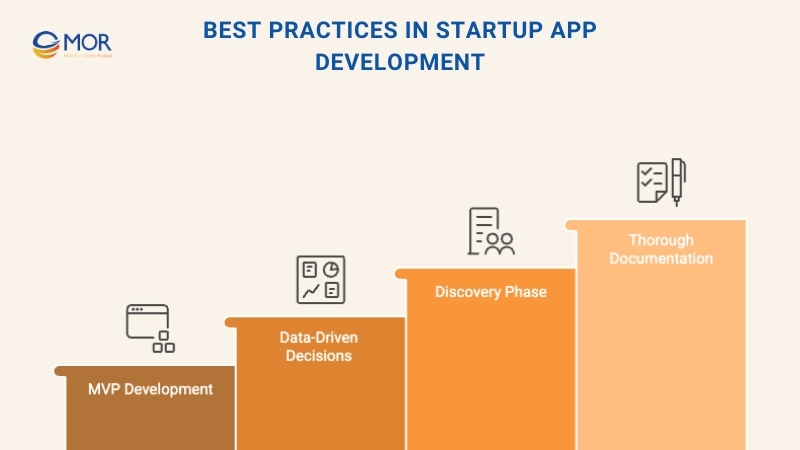
Begin With An MVP
Many founders rush to launch a full-featured product, only to discover that users don’t need most of what was built. This often wastes months of effort and significant funds on features that fail to attract interest. In app development for startups, it’s far smarter to start small with a minimum viable product (MVP).
An MVP delivers only the core functions that solve user problems, allowing startups to gather real feedback before committing more resources. Once the product proves a strong market fit, features can be added gradually to improve the experience. This approach keeps costs manageable and ensures every update moves the app closer to what customers actually want.
Rely On Data For Decisions
In the fast pace of app development for startups, decisions come quickly and often. Data makes those choices far more reliable. Through analyzing user activity, engagement patterns, and even predictions powered by AI automation, founders can anticipate future trends.
For example, reviewing past behaviors can highlight which features customers value most, or reveal shifts in purchasing habits. Building around these insights ensures the app continues to meet demand. With guidance from a software development company for startups, data can move from being a byproduct of usage to the foundation of smarter product planning.
Don’t Skip Discovery Phase
While analytics and data are useful, they cannot replace proper product discovery. This step is essential in app development for startups because it validates whether there is real market demand. Discovery involves surveying your target users, studying competitors, researching industry trends, and evaluating risks. Together, these actions give developers a clear direction and reduce uncertainty.
Skipping discovery can put your startup at serious risk. Projects may take longer, drain more resources, or result in apps that don’t meet customer needs. Taking time at this stage ensures that every line of code is built on a foundation of proven demand, which increases your chance of long-term success.
Keep Thorough Documentation
Documentation is often overlooked, but it’s a cornerstone of smooth app development for startups. Every requirement, technical specification, design choice, and code update should be recorded. This habit creates a reliable knowledge base for the whole team.
Well-kept documentation prepares you for unexpected changes. If a developer leaves, their replacement can review the records and continue without disrupting progress. For startups working with a mobile app business mindset, documentation ensures continuity, helps maintain quality, and supports future scaling.
MOR Software's Experience With App Development For Startups
MOR Software partners with founders and early-stage companies to transform ideas into functional, scalable apps. We understand the urgency startups face with limited budgets, tight deadlines, and the need to validate concepts quickly. Combining expertise in mobile app testing, agile web development, and cloud development, we have helped startups build apps that win users, attract funding, and grow sustainably.
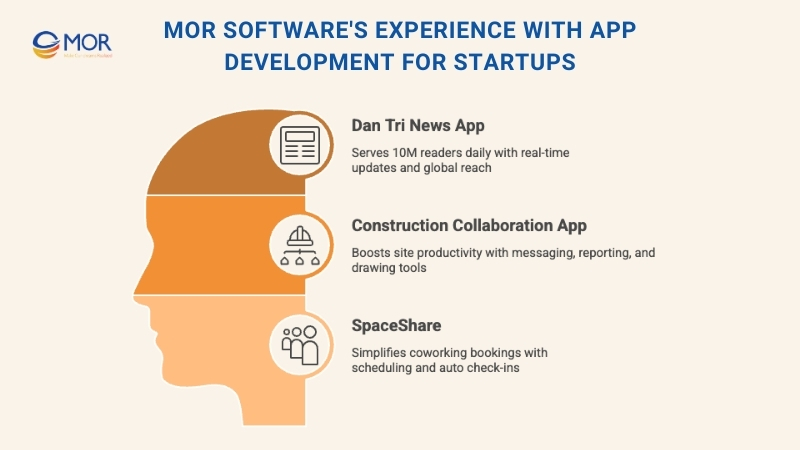
Dan Tri News App
Dan Tri, one of Vietnam’s largest online newspapers, wanted to reach readers worldwide through a mobile platform. We built the app using Swift, Kotlin, .NET, and Python, adding features like customizable layouts, real-time push notifications, and integrated social sharing.
Results: The app now serves over 10 million daily readers in 172 countries, significantly boosting Dan Tri’s digital presence.
Construction Collaboration App
A Japanese construction startup needed to modernize site management. Our team developed a cross-platform app with React Native and FastAPI, enabling task lists, real-time messaging, instant reporting, and drawing tools for visual instructions.
Results: The app improved daily productivity, reduced communication errors, and helped managers deliver projects on time.
SpaceShare
A Vietnamese startup aimed to simplify coworking space bookings. We created SpaceShare with Flutter and AWS, featuring a smooth scheduling system, automated camera-based check-ins, and robust data synchronization.
Results: SpaceShare has become a trusted platform for flexible workspace booking, delivering convenience and earning strong positive feedback from users.
Estimating The Cost Of App Development For Startups
Starting the journey of app development for startups is exciting, but one of the first questions founders ask is, “What will this actually cost?” The answer depends on several factors, including the complexity of the app and the team behind it. Understanding these details early helps set realistic budgets and prevents unexpected financial strain later.
Costs can vary widely between in-house teams and outsourcing partners. An internal team offers more control, but outsourcing often provides flexibility, faster delivery, and lower upfront costs. Many startups also choose outsourcing when working with a mobile development startup, as it allows them to access expertise without heavy overhead.
Here’s a sample cost breakdown to guide planning:
Stage | Description | In-house Estimate | Outsourcing Estimate |
| Basic App | A straightforward app with limited functions, like a utility or informational tool | $5,000 – $20,000 | $2,000 – $30,000 |
| Mid-level App | Applications with moderate complexity, such as IoT integration or social platforms | $20,000 – $100,000 | $30,000 – $100,000 |
| Advanced App | Feature-heavy solutions like gaming or large-scale social media apps | $100,000 – $500,000+ | $100,000 – $300,000+ |
Startups that review these ranges can better plan their resources and choose the most practical development path for their business goals.
Common Challenges In App Development For Startups
Startups often face unique hurdles that can slow down or complicate app development for startups. From budget limits to resource gaps, these challenges can shape the entire journey.
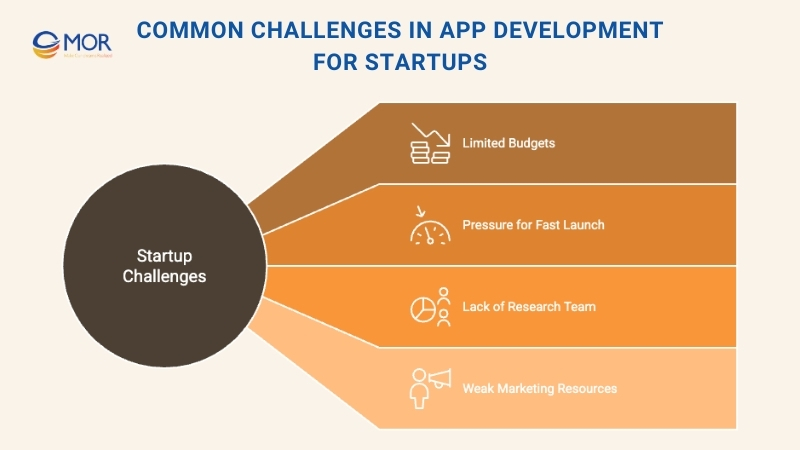
Limited Budgets
Most startups operate with tight budgets that must cover research, development, app store launch, and promotion. This financial strain often prevents them from hiring experienced teams, even though partnering with a custom mobile app development for startups provider could save time and reduce costly mistakes. The limited funds remain one of the biggest barriers in app development for startups.
Pressure For Fast Launch
The race to beat competitors pushes many startups to rush their products to market. In doing so, they sometimes rely on white-label or low-cost solutions that sacrifice quality. While this might provide short-term speed, it can create long-term problems such as poor performance, weak user experience, and higher maintenance costs. Balancing speed with quality is one of the toughest parts of app development for startups.
No Dedicated Research Team
Most startups begin with very small teams, often no more than ten people. With such limited resources, having a dedicated group focused on customer and market research is rare. This gap makes it difficult to gather detailed insights into user needs, even though research is one of the most important steps in app development for startups. Without accurate data, founders risk building features that miss the mark.
Weak Marketing Resources
Another common hurdle in app development for startups is the lack of strong promotion once the app is live. Tight budgets often leave little room for creative campaigns, leaving startups with only basic visibility in crowded app stores. Without clear marketing ideas, even a well-designed product can struggle to gain traction. Partnering with a mobile development startup that understands both product design and promotion can help bridge this gap.
Conclusion
Succeeding in app development for startups takes more than coding, it requires research, smart planning, and continuous improvement. With the right roadmap, founders can transform ideas into products that attract users and investors. At MOR Software, we specialize in guiding startups through every stage, from MVP to scalable growth. Ready to turn your concept into a market-ready app? Contact us today to start building with confidence.
MOR SOFTWARE
Frequently Asked Questions (FAQs)
Why is app development important for startups in 2025?
App development for startups is key to validating ideas, reaching users faster, and attracting funding. A strong app also helps build brand presence early.
How much does app development for startups usually cost?
Costs vary by complexity and team setup. Basic apps may start at $5,000–$20,000, while feature-rich apps can range from $100,000 to $300,000+ if outsourced.
Should startups build apps in-house or outsource development?
It depends on budget and expertise. Outsourcing offers speed and access to experienced teams, while in-house development gives startups full control.
What is the role of an MVP in app development for startups?
An MVP (Minimum Viable Product) helps test the market with core features, collect feedback, and reduce risks before investing in full-scale development.
How long does it take to develop a startup app?
Timelines range from 3–6 months for simple apps to 12+ months for complex platforms. Using agile methods helps shorten delivery cycles and validate faster.
What challenges do startups face in app development?
Common hurdles include limited budgets, lack of market research, tight deadlines, and difficulty promoting apps after launch. Planning helps overcome these.
How can startups monetize their mobile apps?
Popular models include in-app ads, freemium tiers, subscriptions, and paid downloads. The right model depends on your audience and app type.
Rate this article
0
over 5.0 based on 0 reviews
Your rating on this news:
Name
*Email
*Write your comment
*Send your comment
1